Saudi Arabia is preparing to host one of the world's biggest sporting events. With each new construction project, interest in the scale of the investment grows, but so do questions about the cost of implementing it. International organizations are increasingly looking at construction sites.
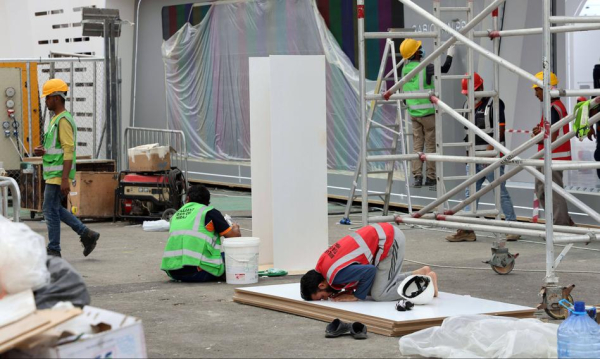
Experts have warned that thousands of migrants will likely die in Saudi Arabia as a result of a construction boom fueled by preparations for the 2034 FIFA World Cup and other major infrastructure projects.
Saudi Arabia has seen a surge in demand for cheap labour, with the number of foreign workers increasing significantly since 2021 as preparations for the World Cup began and work began on projects such as the futuristic megacity Neom.
“ The tournament will cost many human lives”
In two reports published on May 14, the organizations say workers are exposed to serious threats to their lives, while Saudi authorities have been criticized for a lack of transparency regarding migrant deaths.
James Lynch, co-director of FairSquare, which prepared the report on the risks of employing migrants, said:
“Hundreds of thousands of young men are being thrown into a system of work that poses serious threats to their lives. While FIFA sings the praises of Saudi Arabia, children in Nepal are growing up without fathers and never even learning how they died.”
In a separate report on migrant deaths in Saudi Arabia, Human Rights Watch (HRW) accused FIFA of “knowingly risking another tournament that will needlessly cost lives.”
Michael Page, deputy Middle East director at Human Rights Watch, said:
“The horrific workplace accidents involving migrant workers in Saudi Arabia should serve as a huge wake-up call for businesses, football fans and sports associations looking to partner with FIFA to host the 2034 Men’s World Cup. Given the failure of Saudi authorities to provide adequate safety and social security for migrant workers, local and international companies have a greater responsibility to do so.”
Decapitation, electrocution and falls from heights
Earlier this year, The Guardian revealed that a Pakistani worker had fallen to his death during the construction of a World Cup stadium in the city of Al Khobar.
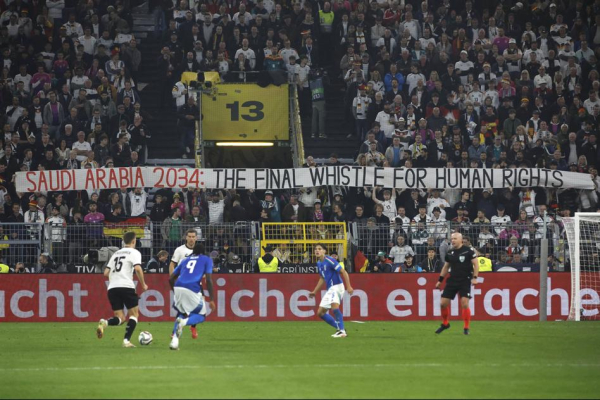
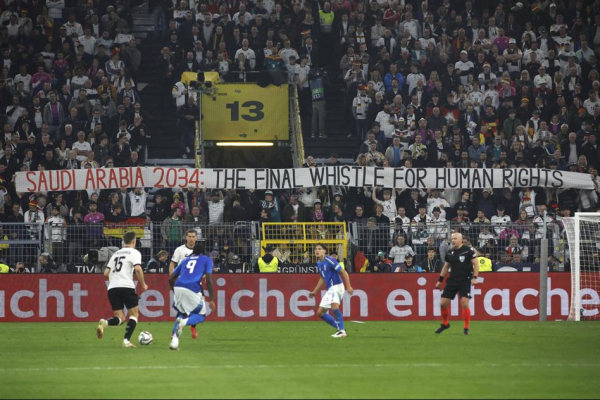
Spectators in Dortmund during the UEFA Nations League match Germany – Italy, hold a protest poster against the 2034 FIFA World Cup in Saudi Arabia. (photo Norbert SCHMIDT / FORUM)
The HRW report documents a series of deaths caused by “gruesome but preventable workplace accidents” in Saudi Arabia – including decapitation, electrocution and falls from heights – leaving families of victims grieving and destitute.
Under Saudi law, if a worker dies while on the job, their family should receive compensation from state insurance or directly from the employer. But HRW called the process “long and cumbersome” and documented many cases where families received little or no support.
Is Saudi Arabia hiding the real number of deaths caused by working conditions?
Saudi authorities say the number of accidents and deaths at work has dropped significantly.
However, organizations like FairSquare have raised concerns about “serious shortcomings in the way Saudi authorities investigate and classify migrant deaths.” Many deaths may be wrongly classified as “natural,” even though they are likely directly or indirectly related to workers’ working and living conditions.
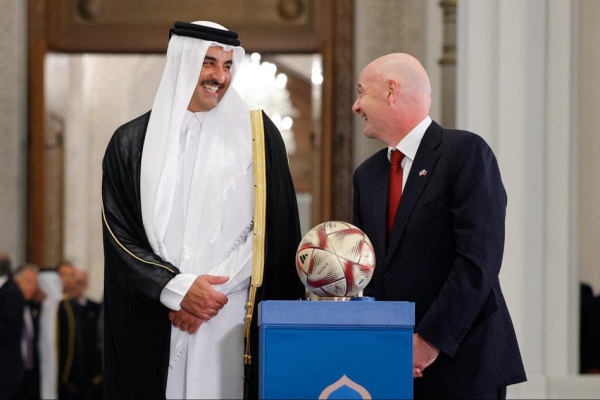
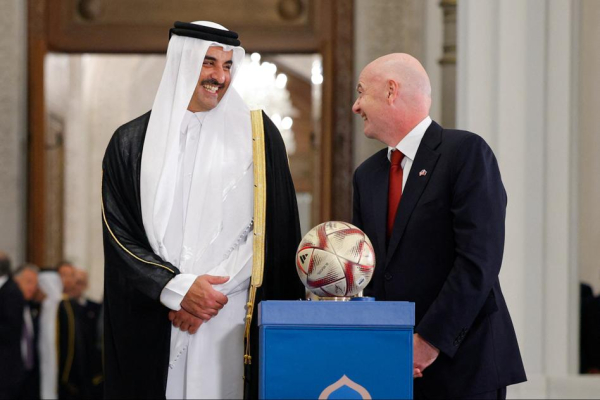
Qatari Emir Tamim bin Hamad Al Thani and FIFA President Gianni Infantino. Qatari organizers of the 2022 World Cup have also been blamed for the deaths of thousands of workers on construction sites. (Photo: Brian Snyder / FORUM)
FairSquare emphasizes that the term “natural” does not provide any real explanation for the cause of death. In its report, the organization notes:
“It appears that Saudi authorities are using the term as shorthand for all deaths that are not the result of workplace accidents, road traffic collisions or other violent causes.”
FIFA says it is monitoring the situation
This position is supported by a 2019 study by a Saudi pathologist who reviewed all death certificates from a Riyadh hospital between 1997 and 2016. He found that in every case, the cause of death was “either incorrect or not given at all,” and in 75% of cases, no cause of death was given.
In response to The Guardian’s request for comment, FIFA released a letter sent to HRW, which reads:
“FIFA is committed to playing its part in ensuring strong protection for workers employed by subcontractors on World Cup construction sites. This work includes close cooperation with Saudi partners and liaison with relevant international workers' organisations. We are confident that the measures implemented can set new standards for worker protection.”
JS






